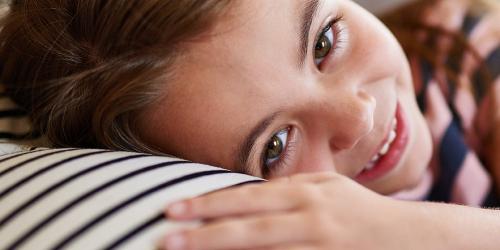Crohn's disease results in inflammation or irritation of part of the digestive tract (which includes several organs from the mouth to the anus).
A chronic pathology , whose origin is unknown, and which belongs to the category of IBD (inflammatory bowel disease).
The symptoms of the disease (diarrhea, blood in the stool, abdominal pain, excessive fatigue, but also joint problems, ocular or cutaneous) are manifested by phases called "outbreaks", separated by more or less long periods of remission.
In France, nearly 120,000 people suffer from Crohn's disease. Among them, Estelle, 43, a police officer, and Florence, 50, assistant manager.
For MC, they agreed to confide on the disease, its difficulties and its acceptance.
A pathology often discovered late
For Estelle, it all started in 2005. In recent years, the young woman - aged 32 at the time - shows early signs of the disease. After an appointment with a gastroenterologist and a battery of tests as unpleasant as each other (colonoscopies, scanner, entero-mirm), nothing and nobody can detect any health problem at home.
Until the day she is about to bowel:
I had some of the intestine removed. The doctors then took the opportunity to do a biopsy and discovered that I had Crohn's disease.
A diagnosis difficult to cash.
"When your gastroenterologist talks about colon cancer, you have a lot going on in your head."
In the long term, the disease can actually progress to this serious pathology.
Florence, she is 23 years old at the time of the diagnosis. Very thin, she undergoes repeated gastroenteritis that push her quickly to consult a specialist.
"He gave me several exams and then concluded that I had nothing, he told me it was nervous, and one year later I had bowel obstruction," she recalls.
The part of his bowel removed during the operation goes into analysis. Result: this is Crohn's disease.
The following years are each punctuated by surgical interventions during which they undergo ablations of part of their intestines: two for Estelle, three for Florence.
Crohn's disease: harsh and often inappropriate treatments
After the discovery of the disease, Estelle is immediately put on treatment. Problem, he begins to attack his kidneys.
Two large outbreaks and as many hospitalizations later, he was prescribed cortisone to reduce his inflammation .
A drug that unfortunately does not work on it. Worse, he even developed a form of dependence in Florence, also treated with this anti-inflammatory: "Initially, cortisone is delivered at a high rate and the goal is to lower it in steps. At a certain stage, the doctors could not lower my doses otherwise it would cause relapses. "
After the cortisone, Estelle thus passes under immunosuppressors , drugs charged to block the immune reaction which contributes to the inflammation.
"The problem is that you catch all possible and unimaginable infections One morning I woke up with a gum abscess, I had an irritated nose all the time, eczema that spread to level of the private parts, I took three sizes of clothes and I lost my memory and I could not concentrate.It totally isolated me in my social life.This treatment is perfect for the intestine but Not for the rest After two years I stopped everything. "
Fortunately, I never reached the stage of having to put a collection bag. I think it must be a lot harder to live with.
Indeed, the digestive stoma, a surgical procedure that involves performing a temporary or definitive opening of a segment of the intestine to the skin, may be considered depending on the severity of inflammation. An operation that serves to eliminate the contents of the intestine via a collection bag (and no longer by "natural" way, that is to say by the anus).
"Before each operation we are warned, depending on what the surgeons are going to find, of the possibility of a pocket.Luckily, I missed it.I do not think I would have supported all that it implies ", adds Florence.
"Outbreaks", crises that isolate
Generally, the "outbreaks" of people with the disease manifest as diarrhea.
This is the case of Florence. But for Estelle, it's quite the opposite: hers take the form of severe constipation.
Very difficult crises to live, as well on the family level, social as professional.
The outbreaks are horribly painful. You can not stand any clothes on your stomach.
"You get painkillers, but it does not help, when you have young children and you have seizures you can not handle them , you're bent in two, when you want to go out, you have to anticipate everything. When your friends invite you to dinner, they have to adapt, sometimes I eat, knowing that it can trigger me, it's disabling, "says Florence.
Even speech on the side of Estelle: "When we eat with people who know us it goes, but others do not understand.In all cases, I do not want to make me sick for them."
Another negative consequence of these outbreaks is the significant fatigue they cause .
"It's very difficult to manage, when a healthy person says he's tired, for me it's going to be double, basically I'm a dynamic person and I had to learn to have rest time , to slow down, to sleep well.The slightest disturbance plays on health ", explains Estelle.
Professional side, both have today a comprehensive hierarchy, but for Estelle, it has not always been the case: "I had a complicated episode because my former managers thought it was 'chewed', it has become a kind of professional harassment. "
Estelle and Florence are both now in a period of remission.
They have had no further surge since four and fifteen years respectively and no longer follow any treatment, preferring to leave room for prevention through a controlled food hygiene.
Dietary habits to reconsider
When one is suffering from Crohn's disease, the diet becomes a central and determining point in its evolution.
"During an operation, I was removed a 'pocket' which is used to assimilate fats cooked, so I can not eat too much all that is fried.As the treatments did not work, we decided to 'a common agreement with my gastroenterologist, to bet on prevention.So I pay attention to what eats to avoid outbreaks,' regrets a little Estelle.
Deprived of pleasure for years, Florence does not want to deprive herself:
I did not eat anything raw, very often pasta, rice, some cooked vegetables and cottage cheese.
"I have been forbidden to eat so much for so long, but today I have been eating everything for two years, except for meat, because I have noticed that the weeks I eat less digest better. "
Make the disease a strength, not a weakness
"I had a hard time accepting it in relation to my work especially, I put my career in parentheses because my illness would slow me down, but today it's part of me, it defines me too. " I consulted a psychologist who allowed me to accept the disease, thanks to her I learned a lot about myself, stress can trigger outbreaks, so I learn to let go, to listen to my body. is a matter of mind, before, I was a real sponge, but I learned to take life simply, no longer take my head, says Estelle.
Anyway, we must accept to be sick for life because we are really sick for life. I make it a strength more than a weakness.
Florence, she tells us not to think any more about her illness: "You have to be a little selfish, think about yourself and not let yourself be led by it.We get so used to the pain that when it is not the more we look for it anyway , we do not find it normal ... Very quickly, we say 'Thin I do not feel my gut move,' we do not hear the noises, we are on the lookout, while he Do not take advantage of these moments of respite. "
Although she has had no more episodes for many years, the evolution of the disease is still followed by Estelle: "From time to time, I have some small inflammations. there, I do dilatory colonoscopies and see what happens with my gastroenterologist. "
For her part, Florence says she "had enough exams". Today, she feels good and does not want to give more space than that to the disease for the moment.




